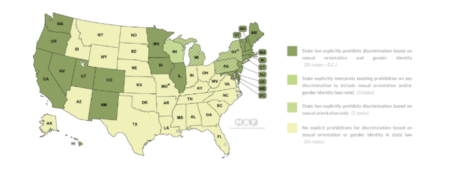The Trump administration is considering issuing new guidelines later this year through the U.S. Department of Health and Human Services that would define a person’s gender as fixed “as male or female based on immutable biological traits identifiable by or before birth,” and disputes around gender settled with genetic tests, according to a memo obtained by The New York Times and published on Sunday.
The report has already sparked protests and activism across the U.S. over concerns that such a policy change would lead to fewer protections against discrimination for transgender people and eradicate the federal government’s official recognition of the 1.4 million Americans who identify with genders outside of their birth sex.
When it comes to real estate, some groups have also voiced their concerns.
Jeff Berger, founder of the nonprofit advocacy group the National Association of Gay and Lesbian Real Estate Professionals (NAGLREP), provided the following e-mailed statement on the proposed changes to Inman through a spokesperson.
“This is cruel and potentially has major negative implications towards the entire LGBT community. It’s disappointing to see any attempt to roll back the incredible gains we have made. Our entire industry should continue to be supportive of transgender agents, others in the real estate industry and consumers.
“There is enough discrimination already towards the LGBT community in housing. We don’t need more. NAGLREP has been fighting discrimination since 2007 and clearly our work is not done. Thankfully the real estate community has embraced us. NAR and Realogy have publicly joined NAGLREP in fully supporting HR 1447 which will add gender identity and sexual orientation to the Fair Housing Act. The real estate industry is such a positive force and hopefully we can add our voice against the administration’s terrible ideas.”
 Surprising rental market trends to watch in 2019
Read the new State of the Property Management Industry Report READ MORE
Surprising rental market trends to watch in 2019
Read the new State of the Property Management Industry Report READ MORE
Inman reached out to the National Association of Realtors (NAR), the industry’s largest trade group with 1.3 million members, about the proposed changes, and in response, received the following e-mailed statement from a spokesperson and attributed to NAR President Elizabeth Mendenhall:
“NAR believes that no person in this country should have the right to rent or purchase shelter of choice abridged because of race, color, religion, sex, handicap, familial status, national origin, sexual orientation, or gender identity. Furthermore, these rights should not be limited because of existing or desired ethnic, racial, or religious proportions in any defined area.”
NAR’s spokesperson further told Inman that in 2010, the trade group updated its Code of Ethics to include the following:
“REALTORS® shall not deny equal professional services to any person for reasons of race, color, religion, sex, handicap, familial status, national origin, sexual orientation, or gender identity. REALTORS® shall not be parties to any plan or agreement to discriminate against a person or persons on the basis of race, color, religion, sex, handicap, familial status, national origin, sexual orientation, or gender identity.
“REALTORS®, in their real estate employment practices, shall not discriminate against any person or persons on the basis of race, color, religion, sex, handicap, familial status, national origin, sexual orientation, or gender identity.”
The previous administration recognized gender as an individual choice not tied to a person’s sex at birth, and that gender choice was protected from discrimination in federally funded education programs under Title IX of the Education Amendments of 1972, which led to some of the recent restroom and sporting controversies in schools, but the current administration has already rolled some of that guidance back.
The Fair Housing Act (FHA) of 1968 made it specifically illegal to discriminate based on race, color, religion, sex, disability, familial status or national origin in the renting or selling of housing. The law does not mention sexuality or gender identity.
However, 22 states plus the District of Columbia offer protections specifically for LGBTQ residents, but a lack of federal guidance makes it difficult for renters and homeowners to seek justice after discrimination has taken place.

States that prohibit housing discrimination based on sexual orientation
A new bill introduced in the Senate and House of Representatives last year, the Fair and Equal Housing Act, aims to update the FHA to explicitly include protections for sexual orientation and gender indentity, but it has not been voted out of committees, voted on by the wider membership of both governing bodies or signed by the president (all three steps are necessary for it to be passed into law).
The lack of official federal protection often leaves the discrimination cases of LGBTQ renters and homeowners hinging on broad interpretations of the FHA, as seen in the 2015 case of Tonya and Rachel Smith.
The Smiths filed a suit against landlord Deepika Avanti for refusing to rent a townhouse to the couple because of their “unique relationship” (Rachel is a trans woman). The Smiths’ lawsuit claimed that Avanti violated the FHA’s rules on sex and familial status and the Colorado Anti-Discrimination Act’s rules on sexual orientation.
After two years of proceedings, U.S. District Judge Raymond P. Moore made a landmark ruling in their favor and said that denying housing for failure to conform to sex stereotypes constitutes sex discrimination under the FHA and, therefore, the FHA offers protection to lesbian, gay, bisexual and transgender people. Moore did not offer any comment as to whether discrimination based solely on sexual orientation or gender identity would be covered.
Source: click here














